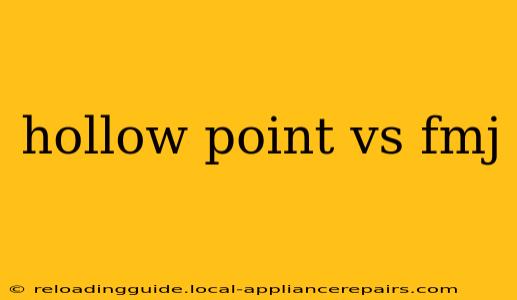Choosing the right ammunition is crucial, whether you're a seasoned shooter, a law enforcement officer, or someone looking to ensure home defense. Understanding the differences between hollow point (HP) and full metal jacket (FMJ) ammunition is paramount for making an informed decision. This comprehensive guide dives deep into the ballistic characteristics, legal considerations, and practical applications of both types, helping you choose the best option for your specific needs.
What is a Hollow Point Bullet?
Hollow point ammunition features a cavity or hollowed-out area in the bullet's tip. This design significantly impacts its performance upon impact. When it strikes a target, the hollow point expands, increasing its diameter and creating a larger wound channel. This expansion leads to greater energy transfer, resulting in a faster stopping power compared to FMJ rounds.
Advantages of Hollow Point Ammunition:
- Increased Stopping Power: The expansion creates a larger wound cavity, leading to more significant tissue damage and a quicker incapacitation of the target. This is crucial for self-defense situations where rapid neutralization is vital.
- Reduced Overpenetration: The energy is expended more quickly within the target, reducing the risk of the bullet passing through and potentially harming unintended individuals or objects behind it. This is a significant safety concern, particularly in densely populated areas or confined spaces.
- Superior Expansion: The design ensures reliable expansion in a wider range of materials, including clothing and barriers.
Disadvantages of Hollow Point Ammunition:
- Cost: Hollow point ammunition is generally more expensive than FMJ ammunition.
- Potential for Jamming (in some cases): The hollow point design can sometimes lead to feeding or functional issues in certain firearms, particularly older or poorly maintained ones. It's essential to test your firearm thoroughly with the chosen ammunition.
- Less Suitable for Target Practice (in some cases): Depending on the target material, hollow point rounds may fragment or deform significantly, making them unsuitable for certain types of target practice where bullet recovery is necessary.
What is a Full Metal Jacket Bullet?
Full metal jacket (FMJ) ammunition is characterized by a lead core completely encased in a metal jacket, typically copper or gilding metal. This design results in a bullet that retains its shape upon impact, penetrating deeply but with less expansion.
Advantages of Full Metal Jacket Ammunition:
- Lower Cost: FMJ ammunition is typically cheaper than hollow point, making it more economical for target practice and high-volume shooting.
- Consistent Performance: The full metal jacket ensures consistent bullet performance, resulting in predictable trajectory and accuracy.
- Greater Penetration: FMJ rounds penetrate deeper than hollow points, making them more suitable for certain applications like long-range shooting or hunting (when appropriate and legal).
Disadvantages of Full Metal Jacket Ammunition:
- Lower Stopping Power: The lack of expansion results in less energy transfer and a smaller wound cavity, requiring more shots to incapacitate a target.
- Increased Overpenetration: The bullet can travel through the intended target and penetrate further, posing a significant safety risk.
- Less Effective Expansion: The hard metal jacket prevents significant expansion, reducing its effectiveness in certain situations.
Legal Considerations:
The legality of hollow point ammunition varies depending on the jurisdiction. Some regions restrict or ban the use of hollow point ammunition for self-defense or hunting. It's crucial to check local and state laws before purchasing or using any type of ammunition.
Choosing the Right Ammunition:
The choice between hollow point and FMJ ammunition depends largely on the intended purpose:
- Self-Defense: Hollow point ammunition is generally preferred for its superior stopping power and reduced overpenetration.
- Target Practice: FMJ ammunition is typically more cost-effective and suitable for range practice.
- Hunting: The choice depends on the game being hunted and local regulations; some hunters prefer FMJ for deep penetration on larger game.
Ultimately, the best ammunition is the one that performs reliably in your specific firearm and aligns with your intended use, while always adhering to local laws and regulations. Thorough testing and practice are vital for ensuring proficiency and safety.

